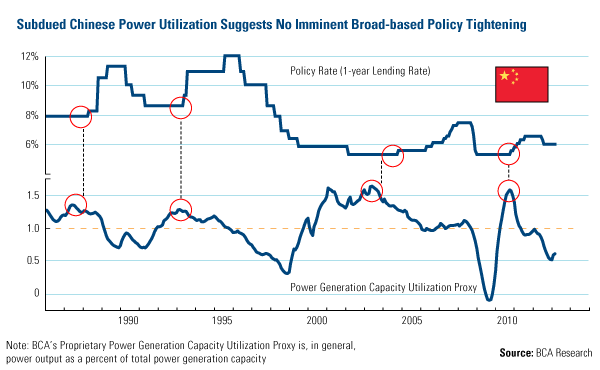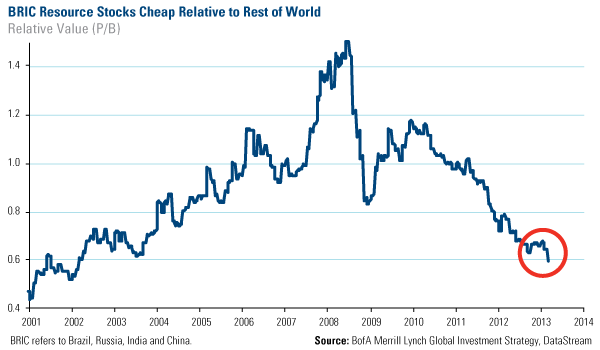Emerging Markets Radar (April 1, 2013)
Strengths
- Fitch upgraded the Philippines’ sovereign debt rating from below investment grade BB+ to investment grade BBB- due to a current account balance surplus and a lower debt-to-government-revenue ratio. Moody’s and S&P have yet to follow through with an upgrade.
- China’s industrial profit growth soared to 17.2 percent in the first two months of the year to 709.2 billion renminbi, suggesting a further recovery of corporate earnings growth year-to-date. Also, based on 84 percent of H-share companies that reported their 2012 earnings, there has been a remarkable sequential improvement in earnings growth to 8.5 percent in the second half from negative growth of 2.8 percent in the first half of 2012. Analysts believe earnings growth recovery will continue in 2013, which should support the market.
- China will cut retail gasoline prices by 310 yuan per ton and diesel by 300 yuan per ton. It also announced it will adjust prices of oil products every 10 working days from 22 days to better reflect changes in the global oil markets.
- Chilean companies continue to sell record amounts of corporate debt overseas as yields on existing securities continue to reach record lows. From investment grade to junk-rate, companies of all sizes are lining up to take advantage of the unsatisfied demand for higher yielding offerings in attractive jurisdictions. In the first quarter, Chilean-dollar-denominated offerings reached $3.8 billion, more than double the amount issued in the same period last year.
- S&P upgraded Turkey’s sovereign rate to BB+, one notch below investment grade, with a stable outlook. S&P has been the most intransigent of the three rating agencies, with Fitch having already given Turkey investment grade. Moody’s is one notch below and is expected to move next.
Weaknesses
- China issued new regulations to limit credit securitization in wealth management products (WMP), capping it at 35 percent of total WMP assets and 4 percent of total bank assets. Bank industry analysts believe the regulations will not have a material impact on the earnings of large banks but may affect smaller banks. The market is concerned that this will in effect tighten liquidity for small business and property developers.
- Colombia reported official unemployment numbers for February this week. Urban unemployment came in at 12.3 percent, down 0.8 percent and in line with Bloomberg survey expectations. The rate is the largest among major Latin American economies and its inability to remain in the single digits shows signs of structural problems in the Colombian labor market. The Colombian central bank cut benchmark interest rates by 50 basis points last week to address its preoccupation with GDP expanding below potential.
Opportunities
- As shown in the graph above, China’s power generators still run much under their capacity. This chart from BCA is based on the historical pattern between the policy interest rate and power generation utilization level, which shows no policy tightening when the sector has been at under-utilization. This technical relationship can be explained by the fact that if power demand is low, the monetary policy should either stay neutral or be easing. Currently, power consumption growth is improving from the 2012 low but still below the historical average.
- The deadline for Argentina to present its final proposal to estranged creditors led by Paul Singer will be this Friday, March 29. Argentine newspapers are reporting the country is likely to offer par bonds for the notional claim, while offering discount bonds to cover the past interest. Deutsche Bank reports this type of settlement would imply a repetition of the settlement reached in the 2005-2010 restructuring, and consider it possible that the government will present a better proposal. We believe this is a great opportunity for Argentina to finally put to rest the ghosts of the 2002 default, but we are certainly not holding our breath.
- The benefits of joining the euro outweigh any costs, said finance ministers of the three Baltic countries, rejecting economist Paul Krugman’s view that Europe’s common currency is a “trap.” Austerity plans that Krugman opposed have helped the Baltic nations recover from the debt crisis in 2008 to become the 27-nation bloc’s fastest growing region.
- While relative underperformance of emerging market equities versus developed markets is likely to continue in 2013, according to Merrill Lynch, any signs of Chinese stability would likely cause a trading bounce in BRIC resource stocks, trading at a ten-year low price-to-book multiple.
Threats
- China’s new WMP regulation may curb financing for small- and medium-sized companies. Those are the companies that have benefited from WMP loans. Many banks have started to lend to small businesses since a year ago to look for loan growth, which might offset the WMP tightening impact.
- Brazilian fiscal spending jumped 13.9 percent in February compared to the prior month, while revenues jumped only 7.4 percent. The gap led the country to post about a $3.2 billion fiscal deficit for the month, reversing some of the January gains. The slower growth in government revenues is accounted for by several tax cuts implemented by the government to spur growth in the slowest-growing BRIC country. The considerable increase in government expenditures may threaten the central bank’s already poor control of the country’s high and unstable inflation.
- Amid Russian security forces shaking down non-governmental organizations, the Russian navy parading unannounced in Black Sea, and Pravda making a statement about Russian nuclear warheads being installed in Cuba, sentiment toward Russian equities is set to worsen.













